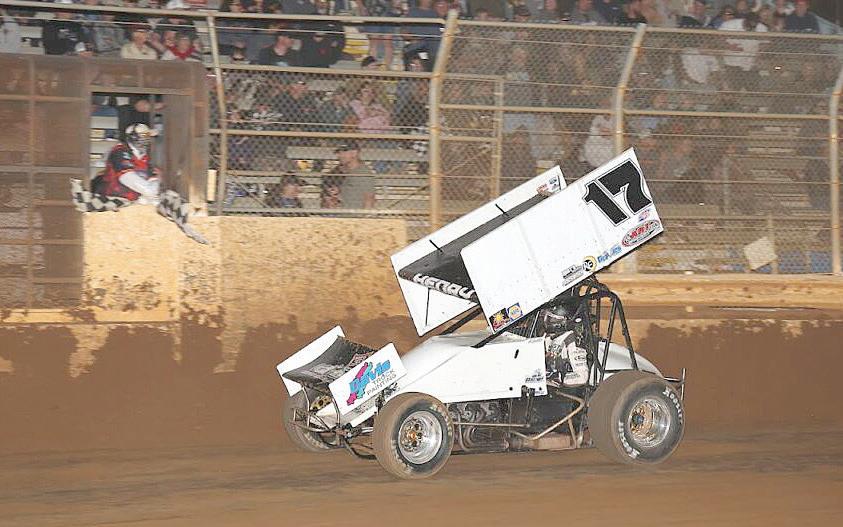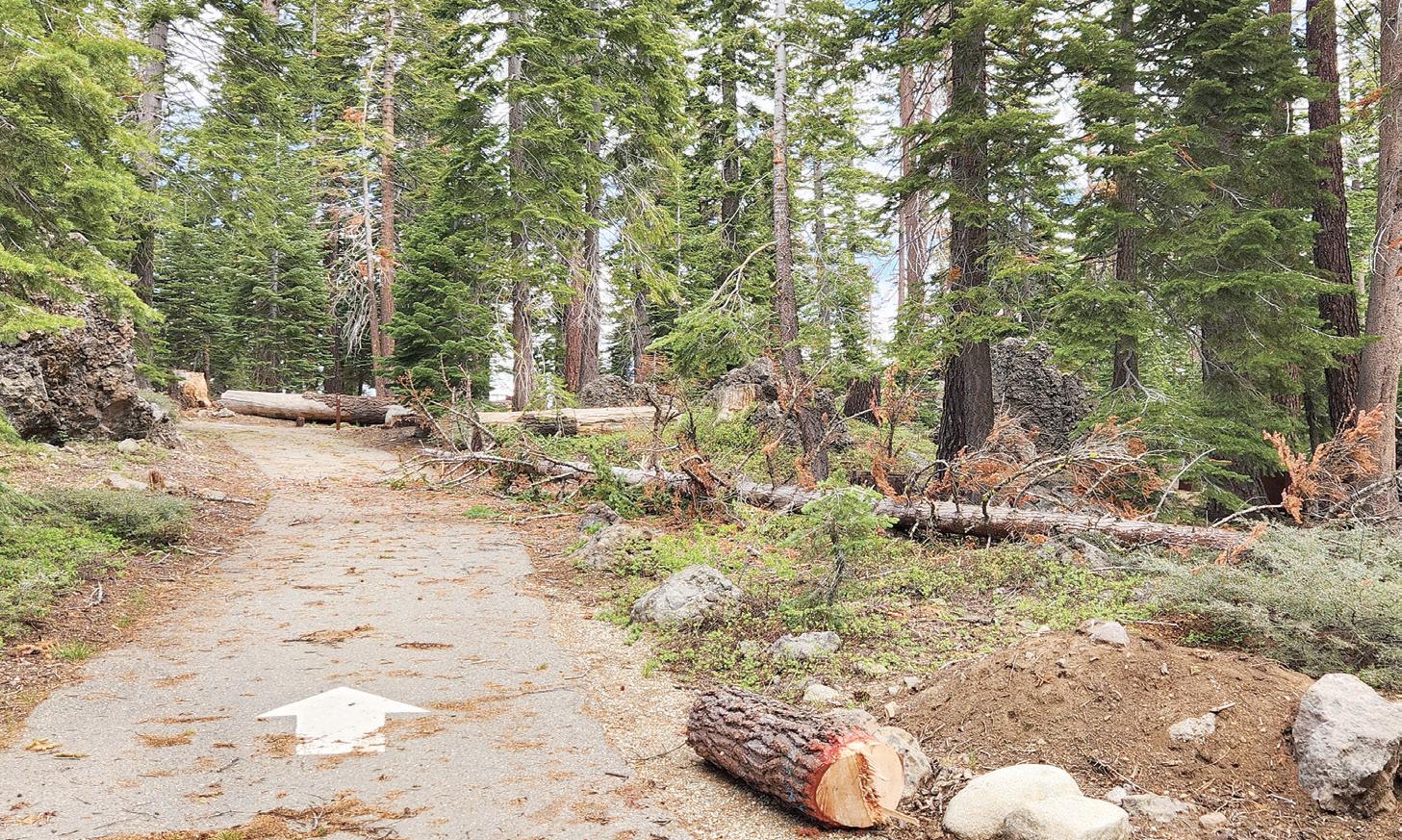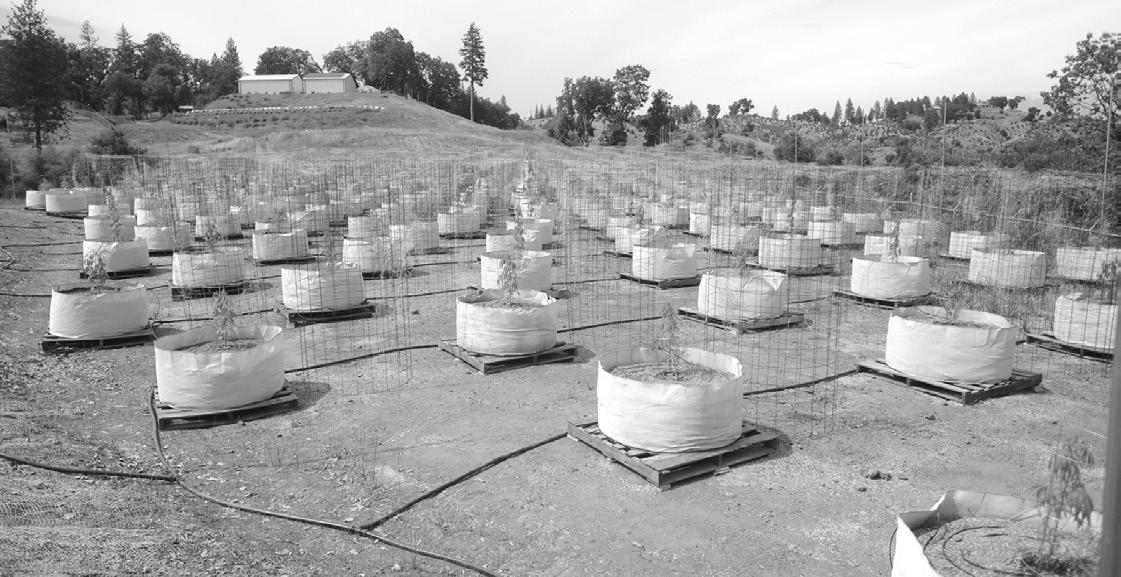
4 minute read
Kalib Henry captures 8th win in Placerville
Gary Thomas Placerville Speedway
Mather’s Kalib Henry cruised to his eighth career Placerville Speedway winged 360 sprint car victory in front of a capacity crowd Saturday night.
Fan Appreciation Night brought out a full pit area of 80 cars and a packed grandstand. Joining Henry in victory lane were Shane Hopkins with the wingless sprints, Dylan Shrum with the dwarf cars and Mike Miller with the mini trucks.

The 25-lap winged sprint car feature ended up being a non-stop affair with action all over the racetrack. Henry shot to the lead at the waving of the green flag and had his way with things out front. The driver of the No. 17 held a sizable lead over the course of the contest but did have to hit his marks wisely during the later stages as Auburn’s Andy Forsberg closed the gap.
Forsberg got to within a few car lengths and looked to find a way past but Henry was too strong on this night and crossed under the checkered flag. With his eighth career triumph he matches Glen Boune for 22nd on the all-time Placerville Speedway winged 360 win list.
The runner up result capped off a strong run in the main event for Forsberg, who captured the B-main and started from ninth aboard the No. 92 mount. Modesto’s Tony Gomes also looked stout in the feature and drove his way to third by the finish, followed by point leader Michael Faccinto of Hanford and Lincoln’s Tanner Carrick rounding out the top five.
Wilton’s Ashlyn Rodriguez ran second over the first half of the race and ended up sixth at the stripe, with Roseville’s Sean Becker, Fair Oak’s Stephen Ingraham, Glendale, Arizona’s Ashton Torgerson and Jake Haulot in the top-10. Heat race wins were pocketed by Tanner Carrick, Sean Becker, Tony Gomes and Michael Faccinto.
Ashton Torgerson earned the Fast n See speedway page A11 area. feet of snow from Cannoli’s wife Kimberly Hooks in the Bay Area.









Though not yet approved to make concentrates like hash, Tannenbaum is hopeful that is one thing he can do with his county-permitted cannabis crop after doing extensive hash research and learning of Cannoli who passed away in 2021.


“Making hashish is a thousands-ofyears-old tradition which I want to be a part of carrying on,” Tannenbaum said. “I want to pass this onto my team to learn and for consumers to enjoy.”
Tannenbaum has spent more than two years getting through the weeds of a county background check process and nearly four years total in the county permitting process to become the county’s first cannabis cultivation farm approved to harvest and sell its crop. Having spent millions of dollars to set up the cannabis farm and maneuver through the politics of local cannabis cultivation following county voters’ 2018 approval of ballot measures to create a commercial cannabis program, Tannenbaum’s business is ripe for harvest this year.
With three full-time and one parttime employee, Tannenbaum has around 2 acres of land he can grow on out of his 206-acre property. This year he is growing on 1 acre — all protected by security measures such as fencing and security cameras.
His farm also contains a greenhouse and processing buildings where his crop will get weighed, dried and packaged to sell to local cannabis retailers.
Strains he is cultivating include
Moroccan Peaches, Molotov Cocktail, Mango Mentality, Gush Mints and several more. Cybele Holdings is growing around 1,300 plants.
“We are very excited to be finally growing this year,” Tannenbaum said, observing his maturing crop as he explained the process of growing cannabis to the Mountain Democrat.
Tannenbaum predicts his farm will produce 1,000-2,000 pounds of crop but said a variety of factors could impact crop figures, including insects, rain, extended cold weather and fire.
The plants come to his farm from a state-licensed nursery in little cubes of rockwool and are put in a 1-gallon pots. Those pots go into the farm’s greenhouse for 30 days to be “hardened off” before they are ready to be planted outside. The pots are prewatered, mycorrhizae is applied to promote root growth and the plants are placed inside a tomato cage. Each plant gets a cup of water a day for about two weeks in late May to help the roots grow down in the soil before Tannenbaum and his team use a Dosatron injector system to feed the cannabis with nutrients and water. Depending on the strain of cannabis, the plants could grow around 6 inches a day, according to Tannenbaum, and could get to 7-12 feet in height. The plants do not produce flowers until mid-August.

Growers like Tannenbaum look for tiny crystal-like sparkly hairs called trichome heads that contain all the THC and will wait until they appear milky with an amber hue. During harvest 3-foot lengths of branches are cut off each plant and hung on racks for a few days in the processing building until the buds on the branches are ready to be cut. The buds are cured for a month until ready for processing and distribution.
The plants are weighed throughout the harvest and drying process, per state regulation.
Tannenbaum will also look to surrounding dispensaries and manufacturers outside of the county to sell his crop.
Tannenbaum’s plants are sourced from Purple City Genetics, an Oaklandbased cultivator.
“I equate what we do to a winegrower.

I grow plants, take my plants at harvest and process them into something that is consumable. Then I sell,” Tannenbaum said.



As a grower, Tannenbaum said he has heard all sorts of stigmas about cannabis use, including a peculiar one where people think those who smoke marijuana will resort to cannibalism or a familiar one that cannabis is considered a gateway drug.
“I’ve had many discussions with people who think that manufacturing cannabis is like the old honey oil labs where you get someone stoned out of their mind making butane honey oil, which is extremely dangerous,” Tannenbaum said. “In today’s legal market with all of the regulations you can’t do that.”
As a businessman and farmer, Tannenbaum hopes to end negative stigmas surrounding cannabis.


“It’s an outdated, old-fashioned mentality I have been working very hard to help and share knowledge so that people do not have the misconceptions that have been around since the 1970s, and I can see that it is working, which gives me satisfaction.”


In addition to growing cannabis, Tannenbaum is hoping to showcase his crop at a cannabis exhibit at the California State Fair in Sacramento.
“We’re not drug lords and not the cartel,” Tannenbaum continued. “We just happen to be growing a crop, like any other farmer, and all we want to do is grow our crop and have our business, make some money and help people.”

As of now, Cybele Holdings is the only commercial cannabis farm allowed to grow and harvest, according to county communications director Carla Hass.











